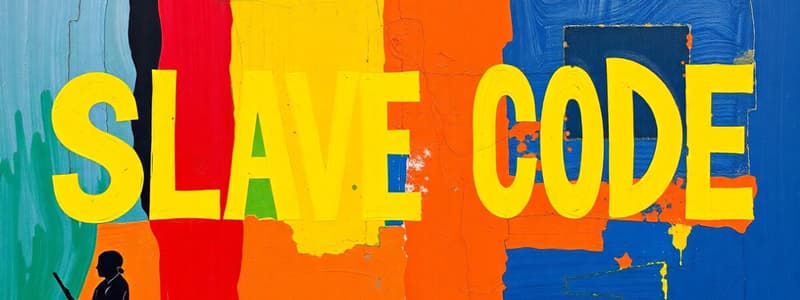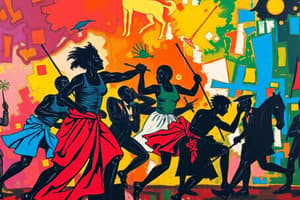Podcast
Questions and Answers
What was prohibited by Virginia’s Slave Code of 1705 regarding black individuals and gun ownership?
What was prohibited by Virginia’s Slave Code of 1705 regarding black individuals and gun ownership?
- Only white individuals could own firearms.
- No black individual, free or enslaved, could own firearms. (correct)
- Gun ownership was allowed for black individuals in certain circumstances.
- Black individuals could own firearms but not use them.
What could happen if a black individual was apprehended by a white person under the Slave Code?
What could happen if a black individual was apprehended by a white person under the Slave Code?
- The black individual had to present a certificate of freedom or pass from their owner. (correct)
- The white person could not legally detain them.
- The black individual could be sold as a slave.
- The white person had to provide a justification for their actions.
Which of the following best describes the status of non-Christian indentured servants brought into Virginia?
Which of the following best describes the status of non-Christian indentured servants brought into Virginia?
- They were treated similarly to Christian indentured servants.
- They were considered slaves regardless of potential conversion to Christianity. (correct)
- They could choose their period of servitude based on their age.
- They had the same rights as free individuals upon arrival.
What action did Thomas Jefferson take regarding the judges appointed by John Adams?
What action did Thomas Jefferson take regarding the judges appointed by John Adams?
What was the basis of William Marbury's lawsuit?
What was the basis of William Marbury's lawsuit?
How did Chief Justice John Marshall rule in relation to the Judiciary Act of 1789?
How did Chief Justice John Marshall rule in relation to the Judiciary Act of 1789?
Which provision of the Slave Code specifically affected the ability of black individuals to engage in physical violence?
Which provision of the Slave Code specifically affected the ability of black individuals to engage in physical violence?
What was the legal identification process for indentured servants brought to Virginia?
What was the legal identification process for indentured servants brought to Virginia?
What key principle did Marbury v. Madison establish?
What key principle did Marbury v. Madison establish?
Which clause of the US Constitution is the basis for the supremacy of federal law over state law?
Which clause of the US Constitution is the basis for the supremacy of federal law over state law?
What was the outcome of Fletcher v. Peck?
What was the outcome of Fletcher v. Peck?
Who was the Chief Justice during Marbury v. Madison?
Who was the Chief Justice during Marbury v. Madison?
Which law was declared unconstitutional in the case of Marbury v. Madison?
Which law was declared unconstitutional in the case of Marbury v. Madison?
What conflict led to the Marbury v. Madison case?
What conflict led to the Marbury v. Madison case?
What does the principle of judicial review allow the Supreme Court to do?
What does the principle of judicial review allow the Supreme Court to do?
Which of the following statements is true about the Supreme Court's role after Marbury v. Madison?
Which of the following statements is true about the Supreme Court's role after Marbury v. Madison?
Flashcards
Virginia Slave Code 1705
Virginia Slave Code 1705
This Virginia law from 1705 was a set of rules that categorized enslaved people as property and restricted their rights. It made it illegal for Black people, whether free or enslaved, to own weapons, strike a white person, or employ a white servant.
Black Slaves as Property
Black Slaves as Property
Black slaves were treated as property with no rights. They could be bought, sold, and inherited like any other possession.
Black People and Guns
Black People and Guns
Black people were strictly forbidden from owning guns. This was a way to control them and prevent any potential rebellions.
Violence Against Whites
Violence Against Whites
Signup and view all the flashcards
Employing White Servants
Employing White Servants
Signup and view all the flashcards
Marbury v. Madison (1803)
Marbury v. Madison (1803)
Signup and view all the flashcards
Adams' Midnight Appointments
Adams' Midnight Appointments
Signup and view all the flashcards
Judiciary Act of 1789
Judiciary Act of 1789
Signup and view all the flashcards
Judicial Review
Judicial Review
Signup and view all the flashcards
Supremacy Clause
Supremacy Clause
Signup and view all the flashcards
Supreme Court's Power of Judicial Review
Supreme Court's Power of Judicial Review
Signup and view all the flashcards
Fletcher v. Peck (1810)
Fletcher v. Peck (1810)
Signup and view all the flashcards
Contract Clause
Contract Clause
Signup and view all the flashcards
The Constitution's Framework
The Constitution's Framework
Signup and view all the flashcards
Fletcher v. Peck (1810) - Significance
Fletcher v. Peck (1810) - Significance
Signup and view all the flashcards
Study Notes
Virginia Slave Code of 1705
- Slavery and Sale: The code allowed for the buying, selling, and inheritance of enslaved black people.
- Racial Restrictions: Black people (both enslaved and free) were prohibited from owning weapons.
- Violence: Black individuals were forbidden from physically harming white people.
- Labor: Black people were prohibited from employing white servants.
- Apprehension: White individuals were permitted to detain any black person to demand documentation (a certificate or pass) proving their freedom or legal permission to be off a plantation.
- Indentured Servitude: Christian servants over 19 years old served until age 24.
- Servant's Age Verification: Indentured servants' ages and service terms were verified in court.
- Servant's Indentures: If a servant claimed indentures, the master could present the servant to a justice of the peace to verify the claim.
- Conversion to Christianity: Servants not Christian in their home country were enslaved, even if they converted later.
Marbury v. Madison (1803)
- Background: President John Adams appointed Federalist judges in his final days in office, and commissions (judges' authority documents) weren't all delivered before Thomas Jefferson's presidency.
- Conflict: Jefferson, a Democratic-Republican, ordered his Secretary of State, James Madison, not to deliver the remaining commissions, intending to block Federalist appointees.
- Lawsuit: William Marbury sued to get his commission, using a clause in the 1789 Judiciary Act that allowed the Supreme Court to compel executive officials to deliver commissions.
- Supreme Court Decision (Chief Justice John Marshall): Marshall ruled the Judiciary Act's provision was unconstitutional, surpassing the power granted by the Constitution to the Supreme Court.
- Judicial Review Establised: This established judicial review—the power of the Supreme Court to interpret laws and declare them unconstitutional.
Fletcher v. Peck (1810)
- Cause: The New Georgia legislature invalidated a land grant and subsequent sales, a contract.
- Significance: The Supreme Court declared a state law unconstitutional for the first time.
- Impact: The ruling extended judicial review to state laws, strengthening the judiciary's role in interpreting the US Constitution.
Studying That Suits You
Use AI to generate personalized quizzes and flashcards to suit your learning preferences.




